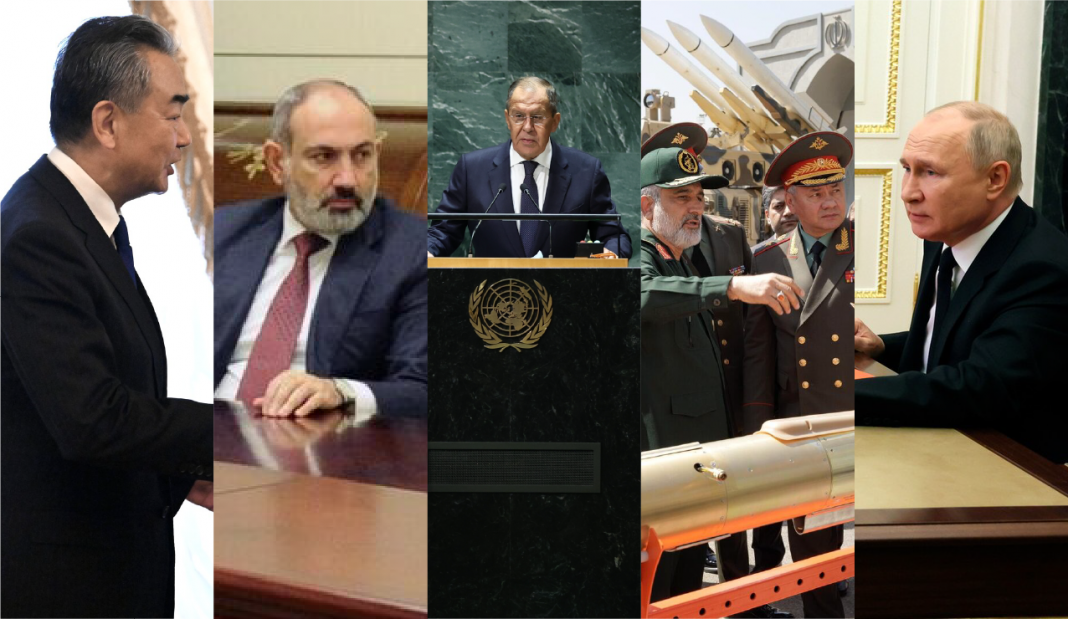This report describes the key events that significantly impacted Russia’s political, economic and social processes.
Based on the results of the past week, the following trends can be summarised:
- Next year, the Russian authorities plan to increase federal spending on the country’s defence. Costs for these purposes will increase from 3.9% in 2023 to 6% in 2024. In this context, the internal struggle between the main influence groups around Putin, responsible for the military-industrial complex and defence, is becoming increasingly noticeable. Soon, we can expect that conflicts between Shoigu and Zolotov will not only become public but also that contradictions between other actors in this area will intensify.
- Wang Yi’s visit to Russia confirmed Putin’s plans to visit Beijing in October. Issues related to further steps towards integrating Belarus and Russia and the prospects for the negotiation process on the war in Ukraine may be resolved there. On the eve of his visit to Moscow, Wang Yi met with Advisor to President Biden Sullivan in Malta, where issues of resolving the situation surrounding the war between Russia and Ukraine were also discussed. It is quite possible that after Putin visits Beijing (which will be a mirror image of Vladimir Zelensky’s visit to Washington), the general contours of an agreement on a peace plan that would satisfy all parties and beneficiaries of the conflict can be developed.
- Despite the demonstration of Sergei Lavrov’s very vigorous activity on the sidelines of the UN, the head of the Foreign Ministry practically did not voice any new theses. However, Russia hinted at the possibility of conducting negotiations regarding Ukraine and even returning to the topic of the territorial integrity of Ukraine – in the event of progress on the issue of the neutral status of Ukraine and guarantees of its non-entry into NATO structures. Of course, such hints should not be taken as a new condition for negotiations. Instead, it is a demonstration of capabilities rather than a statement of readiness.
This digest highlights the following topics that were most relevant for Russia during 18th – 24th of September:
1. Meeting of the Russian Military-Industrial Commission;
2. Meeting of Vladimir Putin with member of the Politburo of the Central Committee of the Communist Party of China Wang Yi;
3. Telephone conversations between Vladimir Putin and Prime Minister of Armenia Nikol Pashinyan and President of Azerbaijan Ilham Aliyev;
4. Meeting of Vladimir Putin with permanent members of the Security Council of the Russian Federation;
5. Sergei Shoigu’s visit to Iran;
6. Participation of Sergei Lavrov in the UN General Assembly;
7. Attack on the headquarters of the Russian Black Sea Fleet.
This Content Is Only For Subscribers
- Meeting of the Russian Military-Industrial Commission
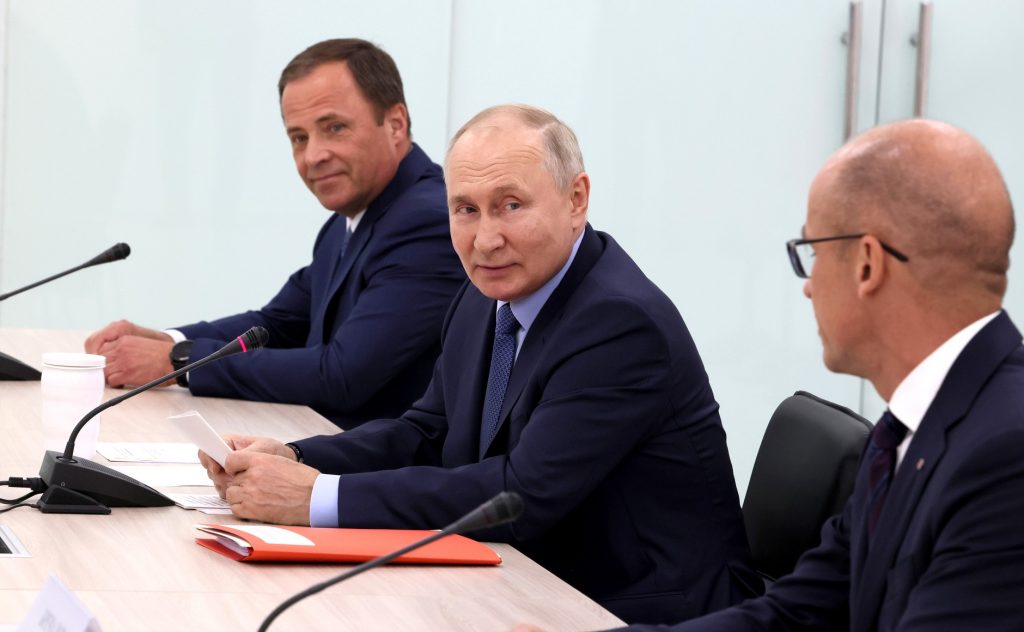
On Tuesday, September 19, Vladimir Putin visited Izhevsk. He took part in a meeting of the Military-Industrial Commission of the Russian Federation. During the meeting, issues of the functioning of the military-industrial complex, technology development, meeting deadlines for set goals, and appointment of new heads of enterprises and design bureaus were discussed. The Russian President congratulated all military-industrial complex workers on Gunsmith’s Day, celebrated in the Russian Federation on this date.
Key theses:
- “Today, the domestic defence industry is creating modern and in many ways unique weapons and equipment, actively increasing production volumes to provide better the units and formations participating in the [so-called] “special operation”, increasing the output of civilian products, which are in increasing demand as in our country and abroad.”
- “Based on the results of eight months this year, defence industry organisations managed to maintain a stable pace of work and not only fulfil the delivery schedule in general but also increase the output of military products in certain areas. For example, the production volume of armoured vehicles has more than doubled compared to last year, and the production of prevalent weapons has tripled.”
- “At the same time, it is necessary to increase the production volumes of counter-battery and air defence systems. In this regard, we discussed this, and I gave several instructions to supplement the supply schedule 2024 with the corresponding nomenclature.”
- “The systematic, consistent implementation of the state program allows us to improve the technical and combat potential of all security forces, to develop and launch into mass production promising models of weapons and equipment.”
Outcomes and outlook:
This event should be assumed not only as a severe emphasis on the need to develop the military-industrial complex – especially in conditions of hostilities but also as a special indulgence to the head of Rostech, Sergei Chemezov, whose possible resignation has long been rumoured – especially against the backdrop of worsening relations between him and influential groups (Kovalchukov, Sechin), as well as against the backdrop of several technical severe failures, to which Chemezov’s department was involved.
However, Putin’s speech at the Military-Industrial Commission, high assessments of the activities of the military-industrial complex, as well as the recent joint trip of two former antipodes – Sergei Kiriyenko and Sergei Shoigu – to Novaya Zemlya show that Putin would not want the continuation and deepening of quarrels and conflicts in the Russian establishment. Chemezov remains on the team.
It is also important to note that the Russian authorities plan to increase federal budget spending on the country’s defence next year. Costs for these purposes will increase from 3.9% in 2023 to 6% in 2024. In this context, the internal struggle between the main influence groups around Putin, responsible for the military-industrial complex and defence, is becoming increasingly noticeable. Shortly, we can expect that conflicts between Shoigu and Zolotov will not only become public but also that contradictions between other actors in this area will intensify.
- Meeting of Vladimir Putin with member of the Politburo of the Central Committee of the Communist Party of China Wang Yi
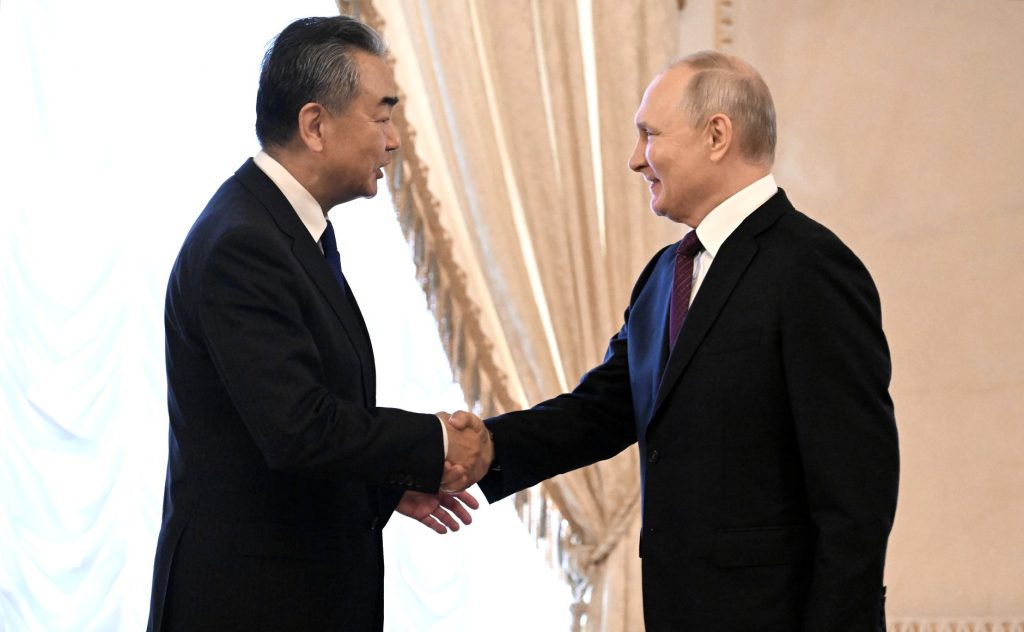
On Wednesday, September 20, Vladimir Putin met at the Konstantinovsky Palace in St. Petersburg with a member of the Politburo of the Central Committee of the Communist Party of the People’s Republic of China, the head of the Office of the Commission of the CPC Central Committee for Foreign Affairs, and the Minister of Foreign Affairs of the People’s Republic of China Wang Yi. According to the parties’ statements, during the meeting, Putin’s visit to China was planned for October, and some geopolitical issues were discussed. It is also noted that the meeting was attended by Secretary of the Security Council Nikolai Patrushev and Ambassador Extraordinary and Plenipotentiary of the People’s Republic of China to the Russian Federation Zhang Hanhui.
Outcomes and outlook:
Wang Yi’s role in the Chinese political system is quite high. This is one of Xi Jinping’s closest associates, “man number three” in the informal Chinese hierarchy, determining the foreign policy of the PRC and being the “general designer” of China’s current system of relations with the outside world, including the “Commonwealth of Common Destiny” project.
If anyone can be considered the “father of the concept of the Global South,” it is Wang Yi. It is essential for the PRC that Putin will arrive in Beijing for the summit, and this will be a symbolic gesture for both sides. It is crucial for Putin that this will be his first foreign visit since the issuance of an international arrest warrant for the Russian leader. For Xi, this will be a powerful argument to strengthen the concept of a “Commonwealth of Common Destiny.”
It is also quite possible that issues related to further steps towards the integration of Belarus and Russia, as well as the prospects for the negotiation process on the issue of the war in Ukraine, will be resolved there. On the eve of his visit to Moscow, Wang Yi met with Advisor to President Biden Sullivan in Malta, where issues of resolving the situation surrounding the war between Russia and Ukraine were also discussed. It may be after Putin visits Beijing (which will be a mirror image of Vladimir Zelensky’s visit to Washington) that the general contours of an agreement on a peace plan that would satisfy all parties and all beneficiaries of the conflict can be developed.
- Telephone conversations between Vladimir Putin and Prime Minister of Armenia Nikol Pashinyan and President of Azerbaijan Ilham Aliyev
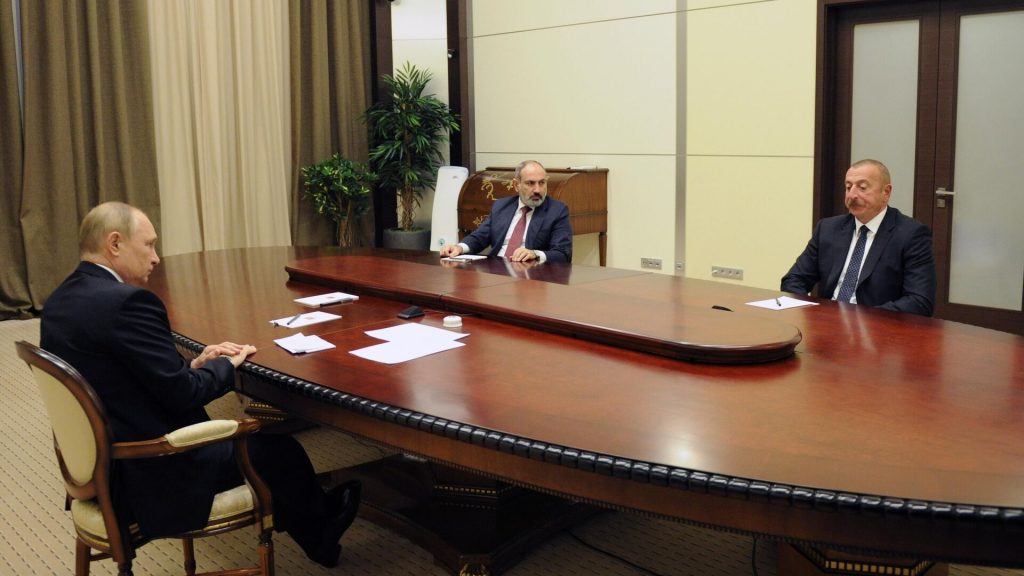
On Wednesday, September 20, against the backdrop of a sharp aggravation of the situation around Nagorno-Karabakh (on September 19, Azerbaijan announced the start of “anti-terrorist measures” in the territory of Nagorno-Karabakh), Vladimir Putin had a telephone conversation with the Prime Minister of Armenia Nikol Pashinyan. According to information from the Russian side, during the conversation, Putin and Pashinyan discussed stopping the fighting and further transitioning to peace negotiations, allegedly achieved through the mediation of the Russian peacekeeping group.
On Thursday, September 21, Putin had a telephone conversation with Azerbaijani President Ilham Aliyev. It is noted that during the conversation, Ilham Aliyev apologised and expressed deep condolences regarding the tragic death of military personnel of the Russian peacekeeping contingent (RMK) in Karabakh on September 20. The parties also discussed further steps to resolve the situation around Nagorno-Karabakh peacefully.
It is noted that the leaders of Armenia and Azerbaijan initiated both conversations.
Outcomes and outlook:
Vladimir Putin is trying to emphasise that Russia is one of the key players in the South Caucasus. It can be assumed with a high degree of probability that the plan to escalate tensions in the region and “disgrace” Armenia was discussed by Putin with President Turkiye Erdogan in Sochi during their recent meeting.
The main goal of this adventure is to throw the United States out of the peace process in the Caucasus. After February 2023, the United States tried in every possible way to show that thanks to the efforts of Antony Blinken, the long-term conflict between Armenia and Azerbaijan was levelled, and a formula for peace was obtained.
Putin and Erdogan have shown that the American peace formula does not work. Azerbaijan received satisfaction for its defeat during the Karabakh war. Armenia lost, but Putin repeatedly signals that the matter is not in Russia’s attitude towards Armenia but in the figure of Pashinyan. These signals have been heard because of the mass rallies in Yerevan and the drop in the ratings of the Armenian Prime Minister.
In addition, Putin and Erdogan attacked the Armenian elites who influenced the political and economic life of France, Switzerland and the USA (California). This could create particular problems for the US Democratic Party, which the Armenian diaspora has traditionally supported. That is why the events around Karabakh are a lengthy multi-step process, which most likely does not end the disputed territory’s tragic history. In Russia, in connection with the events around Karabakh, one can note the strengthening of the pro-Turkish and pro-Baku party – Dmitry Peskov (whom many call the future Minister of Foreign Affairs of the Russian Federation), the Gutserievs, Agalarov and others. And vice versa – the weakening of the pro-Armenian group (Mishustin, Lavrov).
- Meeting of Vladimir Putin with permanent members of the Security Council of the Russian Federation
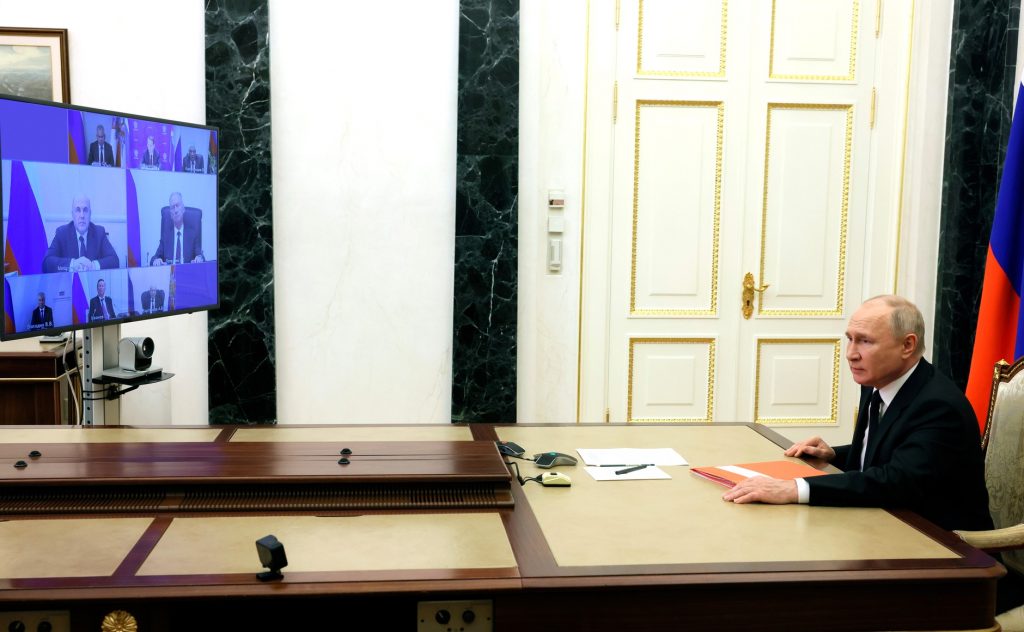
On Friday, September 22, a regular meeting with permanent members of the Security Council of the Russian Federation was held via videoconference. Putin said the main topics of the meeting were the development of relations with closest neighbours and partners, as well as issues of humanitarian cooperation and security in the region.
The meeting was attended by Prime Minister Mikhail Mishustin, Chairman of the State Duma Vyacheslav Volodin, Deputy Chairman of the Security Council Dmitry Medvedev, Chief of the Presidential Administration Anton Vaino, Secretary of the Security Council Nikolai Patrushev, Minister of Internal Affairs Vladimir Kolokoltsev, Minister of Defense Sergei Shoigu, Director of the Federal Security Service Alexander Bortnikov, Director of the Foreign Intelligence Service Sergei Naryshkin and Special Representative of the President on environmental issues, ecology and transport Sergei Ivanov.
Outcomes and outlook:
Meetings of the Security Council of the Russian Federation have become more frequent – Putin demonstrates that he decides the main issues not independently but collectively. Events of this kind should show that there is a common position and a common opinion among the Russian elites. In essence, this is reminiscent of meetings of the Politburo of the CPSU Central Committee of the late USSR. And it doesn’t matter what issues are discussed. What is important is that a picture of a “collective body” and “collective responsibility” is formed in the minds of society.
- Sergei Shoigu’s visit to Iran
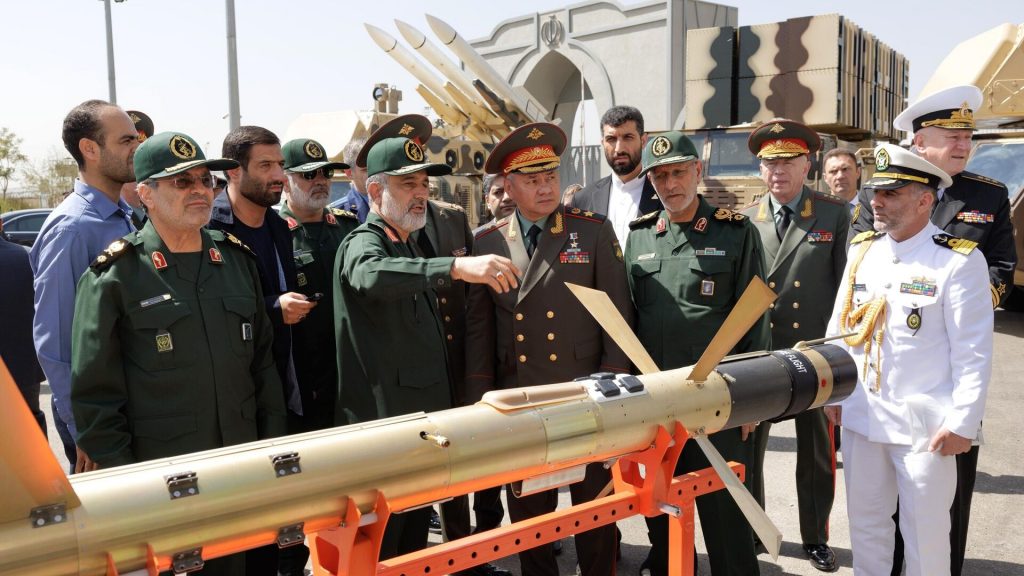
On Tuesday, September 19, Russian Defense Minister Sergei Shoigu and the Russian delegation arrived in Tehran to negotiate with the military leadership of the Islamic Republic of Iran (IRA). In addition to several meetings with senior Iranian military officials, Shoigu visited an exhibition of weapons of the aerospace forces of the Islamic Revolutionary Guard Corps. The Russian Ministry of Defense stated that the main purpose of the visit was to strengthen military ties between the two states.
Outcomes and outlook:
Iran is Russia’s most important partner in the arms market, and Sergei Shoigu’s visit stipulates that Russia will soon purchase the latest types of weapons and technology from Iran. The fact that both states are under international sanctions and are “rogue states” creates the preconditions for closer contact despite the existing sanctions pressure. Both countries are interested in close cooperation with each other. Both countries are interested in Chinese patronage. Both countries are in severe conflict with the US and Western countries. Therefore, their union is more than natural. And Shoigu’s visit is just a symbol of this alliance, another open challenge to the West.
At the same time, we can shortly expect new collective initiatives from Moscow, Tehran, Pyongyang and Minsk. According to Ascolta, with a high degree of probability, we are discussing an attempt to form a new belt of nuclear states under China’s control. At the same time, a new threat of aggravation of relations between Tehran and Riyadh arises since Saudi Arabia publicly declared that if Iran acquires nuclear weapons, the Saudis will have to follow the same path.
- Participation of Sergei Lavrov in the UN General Assembly
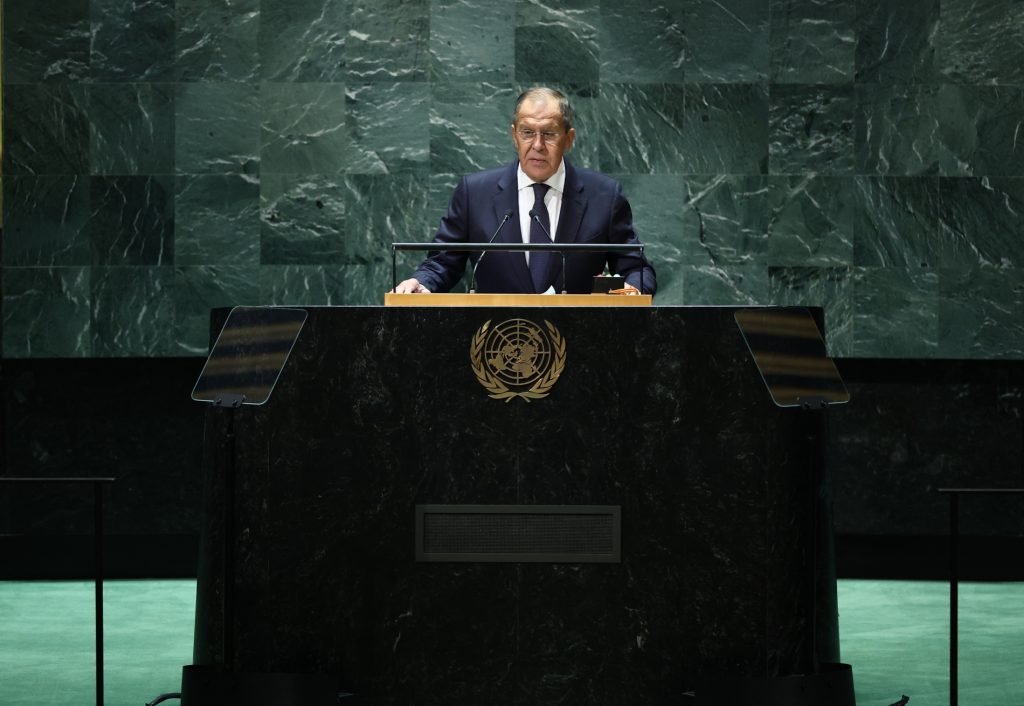
On Monday, September 18, the 78th UN General Assembly opened in New York. Many world leaders, diplomats and politicians attended it. In particular, the Russian delegation led by Sergei Lavrov was also present at the week of high diplomacy. It is noted that during his stay in New York, Lavrov held several meetings with diplomats of other countries and spoke at a meeting of the UN Security Council on the topic “Maintaining international peace and security: promoting the implementation of the principles and goals of the UN Charter through effective multilateralism: maintaining the peace and security of Ukraine.”, and also spoke at the general political discussion of the 78th session of the UN General Assembly.
Lavrov’s key statements at the UN Security Council meeting on the topic “Maintaining international peace and security: promoting the implementation of the principles and purposes of the UN Charter through effective multilateralism: maintaining the peace and security of Ukraine”:
- “Unfortunately, after the end of the Cold War, the “collective West”, led by the United States, arbitrarily assumed the rank of arbiter of the destinies of all mankind and, overwhelmed by a complex of exclusivity, began to increasingly ignore the legacy of the founding fathers of the UN.”
- “Since the collapse of the USSR and the formation of independent states in its place, the United States and its allies have rudely and openly interfered in the internal affairs of Ukraine. As US Deputy Secretary of State Victoria Nuland publicly and proudly admitted at the end of 2013, Washington spent $5 billion on nurturing politicians obedient to the West in Kyiv.”
- “When we hear calls to implement the “peace formula” and return Ukraine to the 1991 borders, the question arises: are those who call for this familiar with the statements of the Ukrainian leadership about what they will do with the inhabitants of the corresponding territories? They are repeatedly threatened publicly, at the official level, with legal or physical extermination. The West not only does not restrain its protégés in Kyiv but also enthusiastically encourages their racist policies.”
- “Let me remind you that in the package with the Minsk agreements, the leaders of Russia, Germany, France and Ukraine signed a declaration in which Berlin and Paris pledged to do a lot, including helping to restore the banking system in Donbas. But they didn’t lift a finger. We just watched as, contrary to all these obligations, Poroshenko declared a trade, economic and transport blockade of Donbas.”
- “Talking about negotiations. We still do not refuse them. Russian President Putin spoke about this many times, including most recently. I would like to remind the distinguished Secretary of State that the President of Ukraine, Zelensky, signed a decree prohibiting negotiations with the Putin government. Suppose the United States is interested in them. In that case, I think it won’t be difficult to “give a command” so that Zelensky’s decree is cancelled.”
- “Today, in the rhetoric of our opponents, we hear only slogans: “invasion, aggression, annexation.” Not a word about the underlying causes of the problem, about how they nurtured an openly Nazi regime for many years, openly rewriting the results of the Second World War and the history of its people. The West avoids a substantive conversation based on facts and respect for all the requirements of the UN Charter. He has no arguments for an honest dialogue.”
- “Those who, contrary to the UN Charter, divide humanity into “democracies” and “autocracies,” would do well to answer the question of which category they classify the Ukrainian regime in. I don’t expect an answer.”
- “The facts speak of a deep crisis in international relations and the West’s lack of desire and will to overcome this crisis.”
- “Today, the question is not about submitting to some kind of “rules-based world order,” but about fulfilling by everyone, the obligations assumed when signing and ratifying the Charter in their entirety and interconnection.”
Lavrov’s key statements at the general political discussion of the UN General Assembly:
- “In the speeches of many speakers who spoke before me, the idea was already voiced that our common planet is experiencing irreversible changes. A new world order is being born before our eyes. The contours of the future are created in struggle. Between the Global Majority, which advocates a more equitable distribution of global goods and civilisational diversity, and between those few who use neo-colonial methods of subjugation to maintain their elusive dominance.”
- “A kind of “calling card” of the “collective West” has long been the rejection of the principle of equality and total inability to negotiate. Accustomed to looking down on the rest of the world, Americans and Europeans often make promises and undertake obligations, including written and legally binding ones. Then they are simply not implemented.”
- “At the end of the Cold War, the Soviet Union played a decisive role in unifying Germany and agreeing on the parameters of a new security architecture in Europe. At the same time, the Soviet and then Russian leadership were given specific political assurances regarding the non-expansion of the NATO military bloc to the East. The corresponding records of the negotiations are in our Western archives. They are freely available. But these assurances from Western leaders turned out to be a deception; they had no intention of fulfilling them.”
- “In 2021, our proposals to conclude agreements on mutual security guarantees in Europe without changing the non-bloc status of Ukraine were arrogantly rejected. The West continued to systematically militarise the Russophobic Kyiv regime, which was brought to power due to a bloody coup and was used to prepare for the outbreak of a hybrid war against our country.”
- “The series of recent joint exercises between the United States and its European NATO allies, including testing scenarios for the use of nuclear weapons on the territory of the Russian Federation, was unprecedented since the end of the Cold War.”
- “A new dangerous manifestation of NATO expansionism has become attempts to extend the bloc’s area of responsibility to the entire Eastern Hemisphere under the crafty slogan of “the indivisibility of the security of the Euro-Atlantic and Indo-Pacific region.” For this purpose, Washington creates military-political mini-alliances under its control, such as AUKUS, the “troika” of the USA – Japan – the Republic of Korea, the “four” of Tokyo – Seoul – Canberra – Wellington, drawing their participants into practical cooperation with NATO, which is implementing its infrastructure in the Pacific theatre.”
- “There is a strong impression that the United States and the “Western collective” completely subordinate to it have decided to give the “Monroe Doctrine” a global projection. The plans are as illusory as they are extremely dangerous, but this does not stop the ideologists of the new edition of Pax Americana.”
- “The United States and the “Western collective” subordinate to it continue to breed conflicts that artificially divide humanity into hostile blocs and hinder achieving common goals. They are doing everything to prevent the formation of a truly multipolar, fair world order. They strive to force the world to play by their notorious and narrowly self-serving “rules.”
- “The West still considers itself superior to the rest of humanity – in the spirit of the already notorious statement of the head of EU diplomacy, Jean-European Borrell, that “Europe is a blooming garden, and everything around is a jungle.” He is not embarrassed that in this garden, there is rampant Islamophobia and other forms of intolerance towards the traditional values of all world religions. Acts of burning the Koran, insults to the Torah, persecution of Orthodox clergy and other mockery of believers’ feelings are rampant in Europe.”
- “A clear manifestation of the selfishness of the Western minority has become the obsessive attempts to “Ukrainize” the agenda of all international discussions, pushing into the background a whole series of unresolved regional crises, many of which have been dragging on for years and even decades.”
- “The escalation of military hysteria by Washington and its Asian allies on the Korean Peninsula, where the US strategic potential is accumulating, is alarming. Russian-Chinese initiatives to consider humanitarian and political tasks as priorities are rejected.”
- “Talking about the decisions of the international community that remain on paper, we call for finally completing the decolonisation process following the resolutions of the General Assembly to achieve an end to colonial and neo-colonial practices.”
- “The expansion of the Security Council is becoming increasingly in demand – solely through eliminating the underrepresentation in its composition of the countries of the World Majority – Asia, Africa and Latin America. New members of the Security Council – permanent and non-permanent – must enjoy authority in their regions and global organisations such as the Non-Aligned Movement, Group of 77, and the Organization of Islamic Cooperation.”
- “The main problem is in the West because developing countries are ready to negotiate, including at the G20 platform, as shown by the group’s recent summit in India. Based on its results, the main conclusion is that the G20 can and should be freed from politicisation, given the opportunity to do what was created to develop generally acceptable measures for managing the world economy and finance.”
Following his visit to New York, Sergei Lavrov held a press conference, during which he made several important remarks:
- “In contact with our colleagues from the countries of Asia, Africa, and Latin America, answering their questions, we spoke in detail about specific aspects of the current phase of the European security crisis. It arose because the West turned Ukraine into “anti-Russia” over many years.”
- “The European security crisis continues. We hope politicians habitually noticing and analysing facts will draw conclusions from what is happening. There are not many of them, but still some are left.”
- “The President of Ukraine and everyone who leads him in Washington, London and Brussels unanimously say that there is no other basis for peace other than the “Zelensky formula.” This “formula” can be described in different ways, but it is unrealisable. Everyone knows this. At the same time, they say that this is the only basis for negotiations, and in general Russia must be defeated “on the battlefield.”
- “This is what we hear as facts. We conclude that no one wants to seriously show understanding of what is happening. Including those who understand but do not want to do it publicly. And in these conditions – once “on the battlefield, “let’s do it.”
- “The fact that in Armenia, as in several other countries of the former Soviet Union, there is a powerful lobby represented by a layer of non-governmental organisations created, including through many Western foundations, promoting the interests of the United States and its allies, they are as follows: to undermine Russia’s influence there, that’s a fact. There are many such organisations there.”
- “I will say this: the United States is a great power. This is clear to everyone. But to run around like that and threaten everyone just to show your obsession with domination – it’s shameful for a great power to do such things.”
- “The Black Sea Initiative consisted of two parts. This was a “package” that was the result of negotiations. It reflected all the interests of the parties, coupled with the interests of other participants. But while the Ukrainian part of the “package” was implemented quite effectively and quickly, the Russian part was not implemented at all.”
- “There are legal norms according to which a country is defined as a direct participant in hostilities. Western states try in every possible way to avoid and not remember them. They are fighting against us with the hands and bodies of Ukrainians. Everyone here who is even slightly interested in the huge flow of information and analytical materials in connection with the Ukrainian situation knows very well that the Americans, the British and many others are fighting. They do this by providing more and more weapons.”
- “Back in 1991, we recognised the sovereignty of Ukraine based on the Declaration of Independence, which it adopted upon leaving the USSR. The Declaration contains a lot of good things, including the fact that they will respect the rights of national minorities; Russian is directly mentioned there, as other languages. Then, all this was included in their Constitution. In the Declaration of Independence, one of our main points was that Ukraine would be a non-aligned country and would not enter any military alliances. In that version, under those conditions, we support the territorial integrity of this state.”
- “We have no problems with the territorial integrity of Ukraine. It was destroyed by those who carried out and supported the coup, whose leaders declared war against their people and began to bomb them.”
- “I heard it said that if Iran gets nuclear weapons, Saudi Arabia will be forced to think about it too. I treat this as a statement of fact. Nobody on the planet wants the emergence of new nuclear states.”
Outcomes and outlook:
Lavrov did not say anything new globally in his speeches. Russia is trying in every possible way to emphasise that it does not give up its claims to being a global player. However, Russia hinted at the possibility of conducting negotiations regarding Ukraine and even returning to the topic of the territorial integrity of Ukraine – in the event of progress on the issue of the neutral status of Ukraine and guarantees of its non-entry into NATO structures.
But it is difficult for the West to agree to this. Although the very statement about the territorial integrity of Ukraine in exchange for neutrality (which was not voiced, but the hint was read more than transparently), a gradual transition to Russian control caused a violent reaction. In any case, the real preconditions for the negotiation process and the actual conditions for peace have yet to be formulated. In the meantime, Russia is determined to resolve issues on the battlefield and not at the negotiating table like Ukraine.
- Attack on the headquarters of the Russian Black Sea Fleet
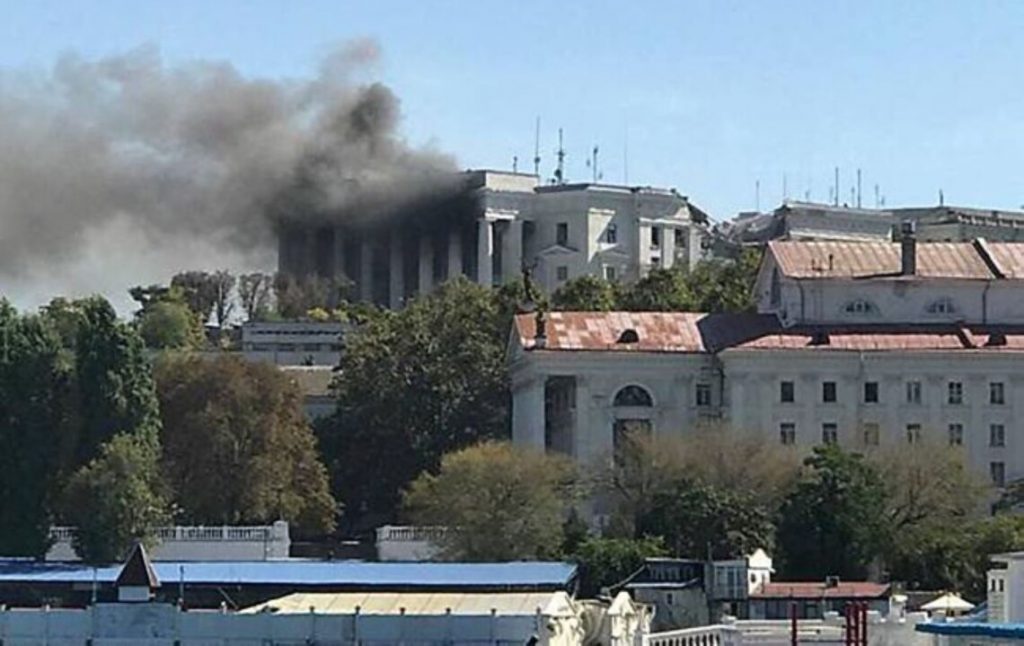
On Friday, September 22, the headquarters of the Russian Black Sea Fleet, located in occupied Sevastopol, was attacked by a missile, leading to severe damage to the building and further fire. Several sources, including the official representative of the Ukrainian Air Force, stated that Storm Shadow missiles carried out the attack. Also, videos published later show that at least two missiles hit the headquarters building.
The Russian Ministry of Defense stated that one serviceman went missing due to the missile attack. At the same time, some sources in Ukraine announced the death of several high-ranking military personnel and heads of the Russian Black Sea Fleet headquarters. Currently, this information has not been officially confirmed.
Outcomes and outlook:
A strike on the almost empty headquarters of the Black Sea Fleet is a symbolic action of the Ukrainian Armed Forces (like strikes on Moscow City or the Kerch Bridge). From a military-strategic point of view, these actions give little, but they raise morale and instil confidence in victory. In any case, Russia suffered humiliation, and its air defence again showed its vulnerability. It is also demonstrated that no invulnerable places cannot hit the Ukrainian Armed Forces in Crimea.
An interesting point is that the Sevastopol strikes were launched when Vladimir Zelensky was in the United States. American senior figures urged him to abandon using long-range weapons in Russia and occupied Crimea.

